What to know:
- Israel launched what it called pre-emptive strikes on southern Lebanon today, after it detected what it said were plans by Hezbollah to launch a "large-scale" attack.
- The region has been on edge after a series of assassinations, believed to have been carried out by Israel, of high-level officials in Lebanon and Iran, including Hezbollah commander Fouad Shukur last month.
- Following Israel's airstrikes, the Iran-backed militia Hezbollah, launched an attack, using a "large number of drones," saying it was in revenge for the killing of Shukur. By Sunday morning local time, Hezbollah announced it had concluded its offensive.
- Hezbollah chose to target the Glilot base, which is near Tel Aviv, Hezbollah’s leader Hassan Nasrallah said in a televised speech today. He said that there was never any intention of targeting civilian infrastructure.
- The U.S. and its allies have been working to avoid a larger regional war in the Middle East since the Oct. 7 Hamas attack in which 1,200 were killed and some 250 kidnapped, according to Israel tallies. Israel's war on Gaza has killed more than 40,000 and injured over 90,000, according to health officials there.
Hamas official says its delegation has left Cairo
A member of Hamas' political bureau announced on Telegram that the group's delegation left Cairo this evening after meeting with Egyptian and Qatari mediators trying to hammer out a cease-fire deal to end the war in Gaza.
Izzat al-Rishq posted on Telegram, saying that the group is sticking to a cease-fire proposal "agreed upon on July 2, based on what was stated in [Joe] Biden's speech and the Security Council resolution."
E.U. representative echoes Lebanese Prime Minister's call to cease hostilities
Josep Borell, the European Union's high representative for foreign affairs, said in a post on X that the situation has reached a "critical level" as he supported Lebanese Prime Minister Najib Mikati's efforts to de-escalate.
"I support Lebanon PM Mikati call for the immediate application of UNSCR 1701, in addition to the much-needed ceasefire in Gaza, to conjure the risk of a full blown war," Borell wrote.
He was referring to the United Nations Security Council Resolution 1701, which calls for a full end of hostilities at the shared border between Israel and Lebanon. Officials have been urging for both Israel and Hezbollah to abide by the resolution for months.
Mikati held a meeting at his residence today with several Lebanese ministers and military officials to discuss the exchange of fire today, the country's state news reported. The prime minister said he was making contact with "Lebanon’s friends" in an effort to stop the escalation of aggression and re-implement the 1701 resolution.
Nasrallah says Hezbollah attack was delayed for cease-fire negotations
Hezbollah's Hassan Nasrallah told Lebanese civilians that the Iran-backed group delayed its response to an Israeli assassination in Beirut in order to allow the ongoing Gaza cease-fire negotiations to continue.
But ultimately Hezbollah chose to target Glilot base, which is near Tel Aviv, Nasrahllah said in a televised speech today. He that there was never any intention of targeting civilian infrastructure.
"We put a set of standards for the target of our response: it was not to be a civilian target, although the enemy targeted civilians and it is our right to target civilians if we wanted, nor infrastructure," Nasrallah said. "It was to be a military target."
Netanyahu said earlier today that the IDF intercepted the attack toward central Israel made by Hezbollah. That base was chosen for its housing of Unit 8200, a military intelligence unit, Nasrallah said.
U.S. Embassy in Beirut reminds citizens remaining in Lebanon to 'prepare contingency plans'
The U.S. Embassy in Beirut reminded its citizens who have not left Lebanon to prepare "contingency plans" and be ready to have to shelter in place for a long period of time.
"Due to high tensions in the region, the security environment remains complex and can change quickly," the embassy said in its security alert. "We remind U.S. citizens of the continued need for caution and encourage them to monitor the news for breaking developments."
A handful of flights were canceled out of Beirut's airport earlier today, but the airport remains fully operational. The U.S. Embassy said its citizens that it can provide repatriation loans for those who may need financial assistance to leave Lebanon.
U.N. forces in Lebanon call for a cease-fire amid 'worrying developments'
The United Nations' Interim Forces in Lebanon (UNIFIL) and Special Coordinator for Lebanon (UNSCOL) called for a cease-fire today, saying in a joint statement that it was urging de-escalation with the organization's contacts in the region.
"In light of worrying developments across the Blue Line since the early morning, UNSCOL and UNIFIL call on all to cease fire and refrain from further escalatory action," the statement, posted to X, said.
Lebanon's state news reported "violent raids" in Wadi Hamoul, an area east of Naqoura. The UNIFIL headquarters is based in Naqoura.
Sen. Elizabeth Warren: 'I am deeply concerned' about the region
Asked on NBC News' "Meet the Press" for her reaction to Israel's strikes on Sunday, Sen. Elizabeth Warren, D-Mass., said she was "deeply concerned about the violence and chaos spreading throughout the region."
"We need to stop all the bombing, get the hostages back home, spend real resources on humanitarian relief in Gaza and most of all, give a hard shove to both parties in order to keep them at the negotiating table," Warren said.
Sen. Cory Booker, D-N.J., also warned of the danger of an escalating conflict.
"The most urgent issue right now is ending this awful conflict in the Middle East, bringing about a cease fire, and stopping this from expanding to a wider arena," he told CNN.
"Last night was really worrisome," he added.
Video shows large explosion in Lebanese town of Zibqine
Video published by Al-Mayadeen news, verified by NBC News, shows large plumes of smoke rising from explosions on the outskirts of Zibqine, a southern Lebanese village near the border with Israel.
The short clip showed an explosion go off next to a significant plume of black smoke. A resident of the town told Reuters he woke to the sounds of planes and explosions before dawn prayer, saying “it felt like the apocalypse.â€
Hezbollah and Amal report deaths of its members
The Amal Movement, a Lebanese political party and militia, announced that one if its members was killed "defending Lebanon and the south."
The man was identified as Ayman Kamel Idriss, who is from the southern town of Khiam in the Nabatieh Governorate. Lebanon's Public Health Emergency Operations Center said one person was killed in a drone strike in Khiam earlier today.
Hezbollah also announced the deaths of two of its fighters, Hamza Mohammad Zalghout and Khader Musa Sweid. The group did not provide the circumstances of their deaths.
Hamas congratulates Hezbollah for assassination response
Hamas congratulated Hezbollah for its "major response" in retaliation to "the crime of assassinating the great jihadist leader Sayyed Fuad Shukr."
Israel’s military said it killed Shukr in an airstrike on the Beirut area of Lebanon in July. It had blamed Shukr for the deadly attack on the Israeli-controlled Golan Heights that killed 12 young people a week before.
In its statement, Hamas said Hezbollah's strike was a message "that crimes against the Palestinian and Lebanese peoples will not pass without a response."
'What happened today is not the end of the verse' Netanyahu says
Reporting from Tel Aviv
Israeli Prime Minister Benjamin Netanyahu directed comments at the leaders of Hezbollah and Iran at the beginning of a cabinet meeting in Tel Aviv, following the latest round of strikes across the Israeli-Lebanon boarder.
"We instructed the Israel Defense Forces to carry out a powerful pre-emptive strike to remove the threat. The IDF destroyed thousands of short-range rockets, and they were all intended to harm our citizens and our forces in the Galilee."
He went on to say that the IDF intercepted "all the drones that Hezbollah launched," and that the IDF was hitting Hezbollah with "surprising thrusts."
According to Hezbollah, they had fired 320 Katyusha rockets towards 11 Israeli bases and military sites.
Addressing Hezbollah leader Hassan Nasrallah and Iran Supreme Leader Ali Khamanei, Netanyahu said: “This is another step on the way to changing the situation in the north, and return our residents safely to their homes.â€
"And I repeat — this is not the end of the verse."
Biden ‘up to speed’ with developments in Israel and Lebanon, says spokesperson
Reporting from Washington D.C.
President Biden is on a family trip in California at the moment, but a spokesman for the National Security Council told NBC News overnight that the President is up to speed with events and had been talking to his national security team.
The spokesperson also said that at the President’s direction, senior U.S. officials have been "communicating continuously with their Israeli counterparts."
He went on to say that "the United States will keep supporting Israel’s right to defend itself, and will keep working for regional stability."
Latest strikes ‘most intense exchange since 2006,’ says analyst
Sunday’s strikes represent a major increase in intensity on the Israel-Lebanon border that risks slipping beyond tit-for-tat retaliation, says Yossi Mekelberg, an associate fellow with the Middle East and North Africa Programme at Chatham House, a London-based international affairs think tank.
“We are on the cusp of something that could be quite dangerous,†he told NBC News, noting that it was the most intense exchange of fire since the 2006 war between Israel and Hezbollah.
“What happens if Israel’s defense system doesn’t work? Or one or two missiles hit a block of flats? By hitting this or that, they provoke each other to retaliate. These are fine margins keeping people awake at night.â€
Hezbollah said Sunday morning that it had completed military operations for the day, but Mekelberg said the conflict could continue to escalate in the coming days.Â
“It means Monday is going to be a different story, right?â€
Video shows apparent rockets intercepted in Haifa
Video shows what appear to be rockets being intercepted in Haifa, Israel, as the country exchanged fire before dawn local time with Hezbollah militants in Lebanon.
Cease-fire negotiations 'going nowhere,' says analyst
Cease-fire negotiations that could bring an end to the fighting in Gaza are set to continue in Cairo this week, and there are concerns that the latest escalation between Israel and Hezbollah could stifle an elusive deal.
But H.A. Hellyer, a scholar at the Carnegie Endowment for International Peace in Washington D.C., believes the cease-fire negotiations were “already in pieces.â€
“I’m not convinced that this morning’s attacks will have much of an impact on the ceasefire negotiations,†he told NBC News. “I don’t think those negotiations were really going anywhere anyway.â€
But Hellyer added that Israel’s strikes on Lebanon demonstrate that Israeli Prime Minister Benjamin Netanyahu was not interested in de-escalating the situation.
“The overall trend here is one of escalation unless you actively try to avoid it,†he added. “And I don’t think that Netanyahu’s actively trying to avoid it at all, it’s been stated many times over recent weeks and months that the Israelis want to reset relations on the border, and they’ve been beating the drum when it comes to Hezbollah.â€
IDF lifts restrictions in northern communities after changing defensive guidelines
Reporting from Jerusalem
The Israel Defense Forces lifted restrictions in some areas on Sunday afternoon following the latest round of strikes between Israel and Hezbollah.
The move follows a "situational assessment" and a decision to make changes to the nation's Home Front Command’s defensive guidelines.
The IDF statement read: "As part of the changes, it was decided that restrictions will be lifted in the areas of the Upper Galilee, specified communities in the southern Golan, the Lower Galilee, the Central Galilee, the Beit She’an Valley, the Valleys, the Haifa Bay, the Carmel, Wadi Ara, Menashe, Sharon, and Dan."
The statement also said that "partial activity" will be permitted in the northern Golan and specified communities in the southern Golan."
Israel sustained 'very little damage' after Hezbollah strikes, says spokesperson
Reporting from Tel Aviv
In a briefing earlier today, Lt. Col. Nadav Shoshani a spokesperson for the Israel Defense Forces, provided updates on the impacts of Hezbollah's strikes on Israel, in response to a question from the New York Times.
"We're still in a situation of the aftermath of the attack," he said, but that there was, "very little damage."
Egypt calls to reduce tensions in region after latest strikes
Egypt's foreign ministry has warned of the dangers of the region "slipping into a state of comprehensive instability" following Sunday morning's strikes between Israel and Hezbollah, calling the developments "dangerous and rapid."
The statement went on to stress the importance of "preserving Lebanon's stability," and reaffirmed its support for a "comprehensive cease-fire and end end to the ongoing war in the Gaza Strip."
Cease-fire negotiations that seek to bring an end to the current conflict between Israel and Hamas are set to take place in the Egyptian capital Cairo this weekend.
Video shows the moment an Israeli fighter jet intercepts a drone over northern Israel
This video, verified by NBC News, shows the moment a UAV is intercepted by the Israeli air force over northern Israel.
What is Hezbollah?Â
Formed in the early 1980s as Lebanon was wracked by a civil war, Hezbollah, sometimes spelled Hizballah or Hezbullah, is a Shia political party and militant organization. The name means “Party of God.â€
Created with support from Iran, the group set a mission to expel Israeli forces from Lebanon, while resisting Western influence in the Middle East.
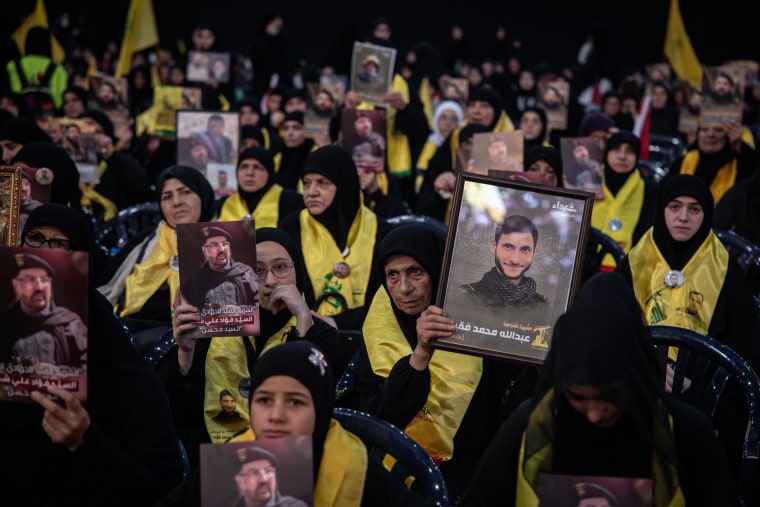
The organization brands itself as a Shia resistance movement within Lebanon that believes in the country’s right to self-determination, while also pledging its allegiance to Iranian Supreme Leader Ali Khamenei, according to a recent report by the Council on Foreign Relations, a New York based think tank.
Hezbollah’s current leader, Hassan Nasrallah, was a member of the Amal Movement, a Shia militia that was one of the many groups vying for power during the Lebanese civil war, before he joined Hezbollah in 1982.
The group’s militant activity and support from Tehran has led the U.S., the United Kingdom and other nations to designate it as a terror organization.
But Hezbollah also has lawmakers sitting in the Lebanese parliament and provides numerous social services within the country.
You can read more about Hezbollah and its fraught relationship with Israel here.
Attacks could "trigger all-out war" between Israel and Hezbollah, says analyst
The latest strikes between Israel and Hezbollah could "easily spiral out of control" and risk triggering "all-out war," says Fawaz Gerges, Professor of International Relations at the London School of Economics.
"These morning attacks mark a turning in their scale and gravity," he told NBC News.
"The core concern is that if the ongoing ceasefire talks in Cairo and Doha fail to end the war in Gaza, the risks of a wider regional conflict will increase considerably."
Gerges added that a cease-fire between Israel and Hamas could end the escalation on the Israel-Lebanese border, while also putting an end to Houthi rebel attacks in the Red Sea.
"It all depends on the cease-fire negotiations," he said.
Hezbollah leader Hassan Nasrallah set to speak Sunday
Hassan Nasrallah, Hezbollah's secretary-general, will deliver a speech at 6 p.m. local time (11 a.m. ET), addressing the latest hostilities with Israel, the group announced earlier today.
3 killed in southern Lebanon, says health ministry
Lebanon's health ministry says three people have been killed after Israeli strikes against Hezbollah hit the country's southern districts.
The ministry said one person was killed in a drone strike on a car in the town of Khiam, after Reuters reported that a fighter from the Hezbollah-allied Shi’ite group Amal was killed in the area.
In another statement, the ministry said an attack on the village of Tiri killed two people.
Israeli air strikes hit villages in Nabatieh District — Lebanon state media
Reporting from Beirut, Lebanon
Israel's Sunday morning air strikes struck villages in south Lebanon's Nabatieh District, according to Lebanon's state-run National News Agency, calling the attack a "large-scale air aggression."
Their correspondent in Nabatieh said the attacks targeted Chqif Castle, the outskirts of the town of Ain Qana, Kfar Fila, Louaizeh, Bsalia, and Kfar Melki, as well as the Bir Kalb area and the outskirts of the towns of Sajd, Kfar Fila, and Sarba.
Another NNA correspondent in the southern Tyre district reported "violent raids" on Wadi Hamoul and the Tasheelat area.
IDF continues strikes on targets in southern Lebanon
Reporting from Tel Aviv, Israel
The Israeli military says it struck Hezbollah launchers in several areas in southern Lebanon into Sunday morning, announcing the strikes at around 11 a.m. local time.
The Israel Defense Forces said it identified a "terrorist cell" operating in the area of Khiam in southern Lebanon.
In a post on X, Israel Defense Forces spokesperson Daniel Hagari said "The IDF is doing and will continue to do everything necessary to protect the citizens of the State of Israel.â€
Israeli diplomats head to cease-fire talks, progress made on Philadelphi Corridor, says official
Reporting from Tel Aviv
An Israeli official has told NBC News that Israeli diplomats will head to Cairo for further talks despite this morning’s fighting between Israel and Hezbollah. The delegation will leave within the next few hours, the official said.
Despite the pessimism surrounding the continued negotiations, the official said that progress had been made regarding a new and crucial obstacle: Whether Israel would maintain a presence along the Philadelphi Corridor, a name for the border between the Gaza Strip and Israel.
“There is an understanding of what I would say is that Israel will stay alongside the Philadelphi but in very limited capacity alongside key strategic points,†the official said.
The official did not offer details of the “limited capacity†in which Israel would remain on the corridor as part of the deal.
“I haven’t seen the plan or the map,†the official said.
While Hezbollah proceeded to attack Israel without waiting for the negotiations to succeed or fail, the Israeli official said the thinking within Israel’s government is that Iran will likely wait for the negotiations to end before it follows through with its avowed retaliation for the assassination of Ismail Haniyeh in Tehran last month — an killing that the Israelis have neither disavowed nor claimed.
“There is a notion from what I gathered from political sources from the officials that I speak to that [the Iranians are] going to watch and see how the deal plays out,†the official said.Â
Israeli fighter jet intercepts a Hezbollah UAV
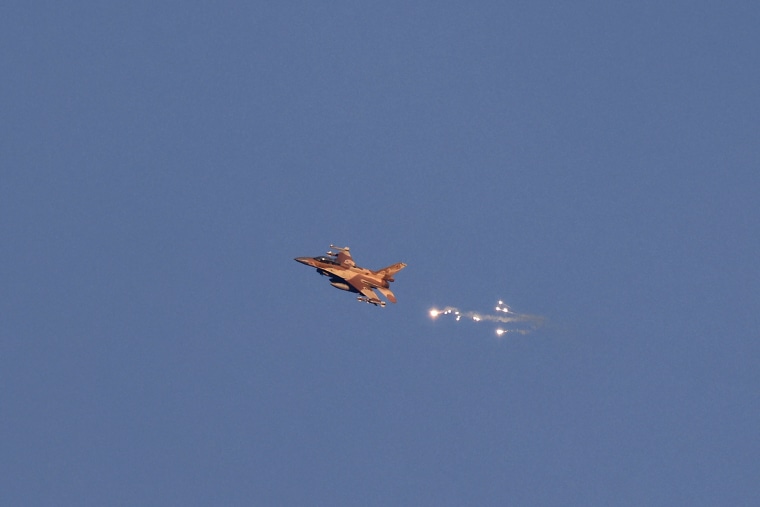
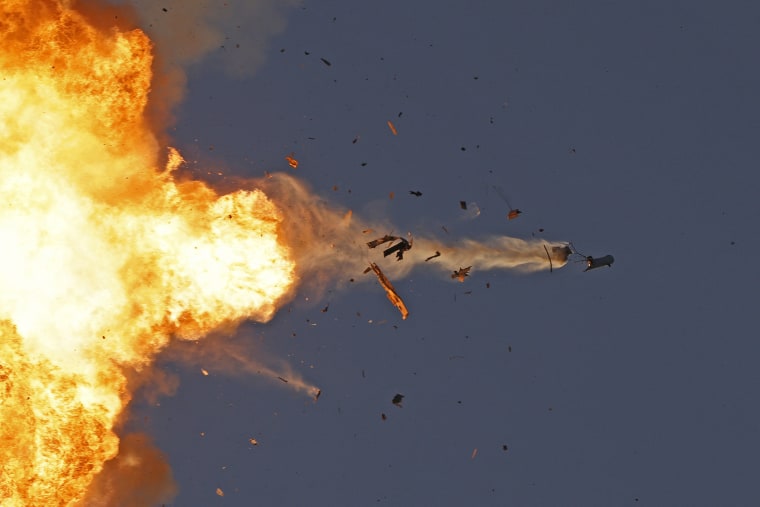
1 killed in Lebanon after Israeli strikes
One person was killed after an Israeli strike hit the southern Lebanon town of Khiam, two security sources told Reuters.
They said the the deceased was a fighter from the Hezbollah-allied Shi’ite group Amal.
United States reaffirms 'ironclad commitment' to Israel
Secretary of Defense Lloyd J. Austin III spoke on the phone with Israeli Minister of Defense Yoav Gallant following the strikes to discuss Israel's defense against Hezbollah attacks.
During the call, Austin reaffirmed the United States' "ironclad commitment to Israel's defense a against any attacks by Iran and its regional partners and proxies."
Israel foreign minister says it is not seeking 'all-out war'
Israel "does not seek an all-out war" in the region, according to Foreign Minister Israel Katz.
In a statement on X, Israel's foreign ministry said the country had acted "after definitively identifying a large-scale planned attack," and will "act according to developments on the ground."
The statement goes on to say that Israel was "acting to protect its citizens" against "an axis of evil" led by Iran, as Katz called on his counterparts to support the country.
Hezbollah says it has completed military operation for today
Hezbollah said its military operation was accomplished and has concluded for today.
In a statement, the militant group said its "offensive marches" were successfully launched "and crossed the Lebanese-Palestinian borders towards the desired target." Hezbollah also pushed back on Israel's claim that it had launched a successful preemptive strike targeting the Iran-backed group.
"The enemy’s claims about the preemptive action it carried out and the targets it achieved and its disruption of the resistance’s attack are empty claims and contradict the facts on the ground," the group said, adding that its leader, Sayyed Hassan Nasrallah, will refute Israel's claims in a speech.
Netanyahu: ‘Whoever hurts us — we hurt him’
Israeli Prime Minister Benjamin Netanyahu today vowed to protect Israel and delivered a promise and a warning: “Whoever hurts us — we hurt him.â€
The comments came at the beginning of a meeting of Israel’s security cabinet in which the prime minister said he, the minister of defense and the chief of staff directed the IDF to launch preemptive strikes on Hezbollah targets.
The strikes took out thousands of rockets aimed at northern Israel and thwarted other threats, Netanyahu said.
"We are determined to do everything to protect our country, return the residents of the north safely to their homes and continue to uphold a simple rule: Whoever hurts us — we hurt him," he said.
Israeli military leader says Hezbollah plans included civilian targets
An Israeli military leader this morning said the nation's forces were able to stop at least part of a planned Hezbollah attack in retaliation for Israel's assassination of a top Hezbollah commander last month.
In a briefing today, Lt. Col. Nadav Shoshani said Lebanon-based Hezbollah militants had been preparing to launch an extensive rocket attack against northern Israel using thousands of rocket launchers. The operation was to begin at 5 a.m., he said, before it was thwarted, in part, by Israel's preemptive charge.
Israel's assault included 100 aircraft that targeted thousands of Hezbollah rocket launchers in 40 launch areas, Shoshani said.
Hezbollah carried on with its mission, he said, firing hundreds of rockets and UAVs toward northern Israel and without omitting areas with homes and civilians.
"This is a part of a larger attack that was planned," Shoshani said, "and we were able to thwart a big part of it."
Hezbollah said in a statement earlier today that it hit 11 targets, all military bases, barracks or artillery positions.
Shoshani made clear that Israel saw the Hezbollah plans as a serious threat on its civilian population. "Israel will not tolerate Hezbollah's attacks on our civilians, and we keep the right to defend our people," the lieutenant colonel said.
He said it wasn't yet clear if Hezbollah was done with its attack as planned. "We're still assessing," he said.
Attacks between Israel, Hezbollah come at crucial time in cease-fire talks
The night's strikes and counterstrikes between Israeli forces and Hezbollah militants came at a crucial time in Israel-Hamas cease fire talks.
The United States has officials in Cairo, location of the talks, urging compromise that would create a cease-fire in the war between Israel and Hamas militants. Hezbollah has sided with Hamas.
The negotiations restarted Saturday, according to Reuters, with little progress made.
Yesterday, President Joe Biden spoke to Sheikh Tamim bin Hamad Al Thani of Qatar and President Abdel-Fattah El Sisi of Egypt, emphasizing the need to remove any obstacles to a deal, according to White House readouts of the phone calls.
Biden and his counterparts want to see a cease-fire that also frees Israeli and other hostages being held by militants in Gaza, brings food, water and medical care to Palestinian civilians in Gaza, and deescalates regional tensions, according to the White House statements.
New attacks between Israel and Hezbollah, widely seen as a proxy of Iran, wouldn't seem to achieve that goal. A National Security Council spokesperson said overnight that Biden was watching the situation closely.
Israeli fighter jets took out Hezbollah 'firing canisters,' IDF spokesman says
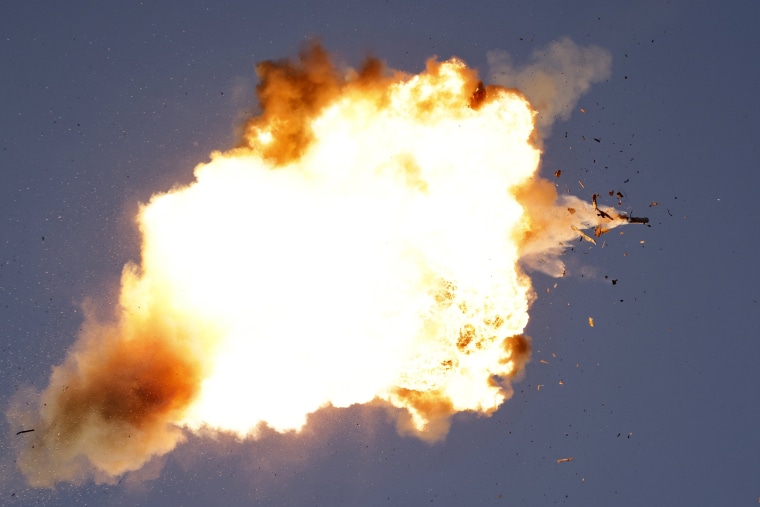
About 100 Israeli Air Force fighter jets destroyed Hezbollah "firing canisters" that were headed for northern Israel, an Israeli defense spokesperson said.
Israel Defense Forces spokesperson Daniel Hagari said in a statement that "thousands" of the Hezbollah canisters were taken out by the Air Force fighters.
Some of the munitions, he said, were aimed at central Israel.
Hezbollah says attacks on Israeli targets are proving successful
Hezbollah said today that it has successfully attacked Israeli sites.
In a statement, it said the first phase of a campaign against Israel has been completed.
"The first phase has been completed with complete success," the statement reads. "This phase involved targeting zionist barracks and sites to facilitate the passage of attack drones towards their intended targets deep within the entity."
The Iran-backed militant group gave some credit to its attack drones, which it said "crossed as planned" into Israel.
The group also said it has fired 320 Katyusha rockets and listed 11 Israeli bases and military sites it said were struck successfully.
NBC News has not immediately able to verify the details in the statement.
White House is monitoring the situation
President Joe Biden is keeping an eye on the situation, a National Security Council spokesperson said.
“President Biden is closely monitoring events in Israel and Lebanon," NSC spokesperson Sean Savett said.
"He has been engaged with his national security team throughout the evening," Savett said. "At his direction, senior U.S. officials have been communicating continuously with their Israeli counterparts."
Drawing Hezbollah and possibly Iran, its backer, into Israel's war with Hamas militants in Gaza is something the United States wants to avoid, and the White House has been pushing for a cease-fire amid ongoing talks.
"We will keep supporting Israel’s right to defend itself," Savett said, "and we will keep working for regional stability.â€
After temporary shut down, Israel's main international airport returns to operations
Israel's main international airport, Ben Gurion, was returning to normal operations early Sunday, a spokesperson for the Israeli Airport Authority said in a statement.
“According to the assessment of the situation, Israel Airport is expected to return to operations ... including takeoffs and landings," the spokesperson said.
The airport was shut down temporarily amid the strikes between Israel and Hezbollah, during which time some planes were diverted to alternative airports, the spokesperson said.
Israeli minister of defense: Israel attacked Hezbollah preemptively
In a call today with U.S. Defense Secretary Lloyd Austin, Israeli Minister of Defense Yoav Gallant explained Israel's military action as preemptive and designed to protect its citizens.
Gallant declared a "special situation on the home front" in response to the back-and-forth strikes with Iran-backed Hezbollah militants, saying the move can restrict gatherings to increase Israelis' safety during the battle.
On the call, he told Austin that Israeli forces knew Hezbollah planned to attack it tonight for its assassination of a top commander last month and thus launched its preemptive operation, according to a statement provided by the Israel’s defense ministry.
“We have conducted precise strikes in Lebanon in order to thwart an imminent threat against the citizens of Israel," he told Austin. "We are closely following developments in Beirut, and we are determined to use all the means at our disposal in order to defend our citizens."
Both men discussed the importance of avoiding regional escalation in Israel's ongoing war with Hamas militants in Gaza, with whom Iran and Hezbollah sympathize, according to the defense ministry.
Austin "reaffirmed the United States’ ironclad commitment to Israel’s defense against any attacks by Iran and its regional partners and proxies," according to a readout of the call provided by Pentagon Press Secretary Maj. Gen. Pat Ryder.
Israel had evidence Hezbollah was about to attack, military spokesperson says
Israel Defense Forces spokesperson Daniel Hagari said in a statement today that leaders believed Hezbollah was preparing to attack.
"We conducted preemptive strikes after seeing Hezbollah starting to get ready to attack us," he said. "We will do all it takes to protect Israel."
He urged Israelis to be vigilant. "People can go out as long as there is shelter nearby," he said.
Israelis stage heavy airstrikes in Lebanon as Hezbollah launches drone attack on Israel
Reporting from Jerusalem
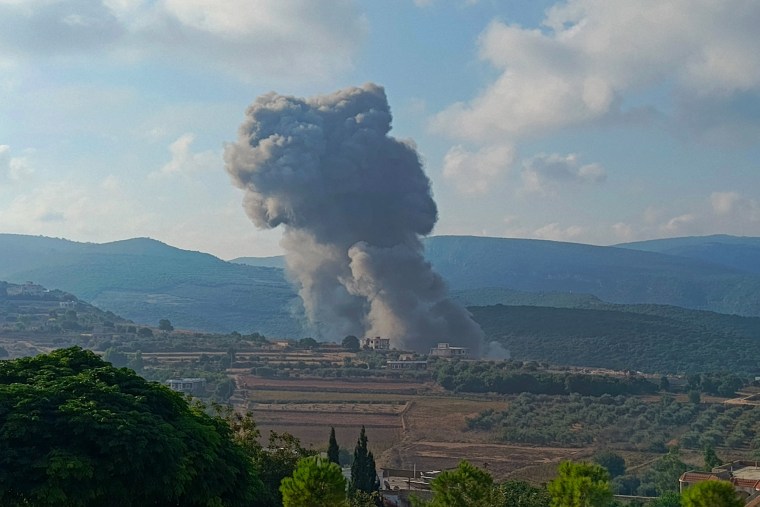
Israel launched a series of intense airstrikes in southern Lebanon early Sunday in what it said was a pre-emptive strike against the Hezbollah militant group, threatening to trigger a broader regionwide war that could torpedo efforts to forge a cease-fire in Gaza.
The army said Hezbollah was planning to launch a heavy barrage of rockets and missiles toward Israel. The Iranian-backed group had been promising to retaliate for Israel’s assassination of a top commander late last month.
Air raid sirens were reported throughout northern Israel, and Israel’s Ben-Gurion international airport began diverting incoming flights and delaying takeoffs.
Soon afterward, Hezbollah announced it had launched an attack on Israel with a “large number of drones†as an initial response to the killing of Fouad Shukur, a top commander with the group, in a strike in Beirut’s southern suburbs last month.







